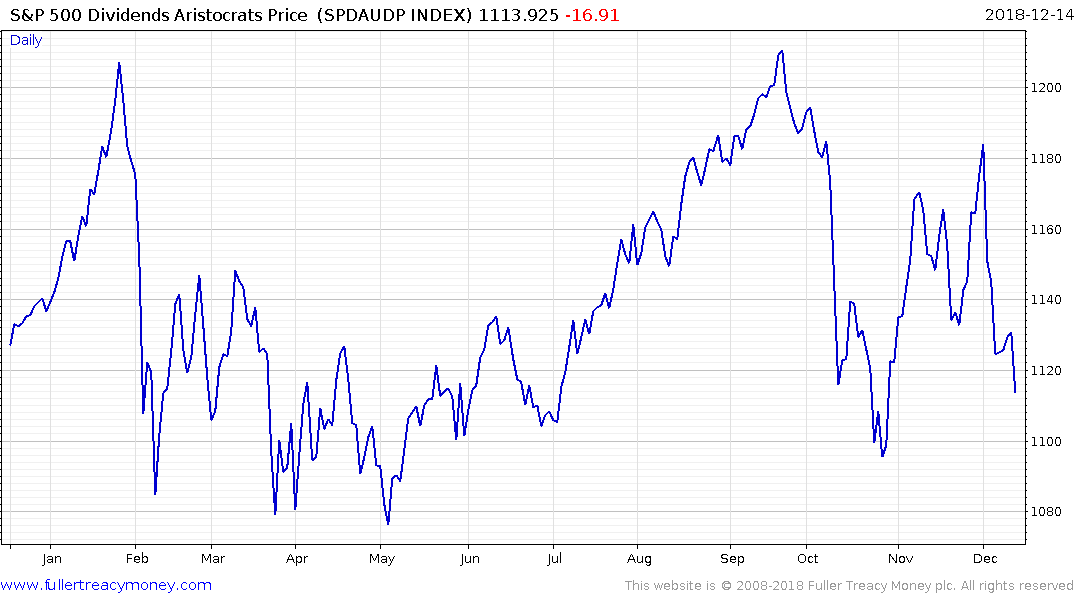The equity chief at $6.3 trillion BlackRock weighs in on the trade war, a possible recession, and offers her best investing advice for a tricky 2019 landscape
This article by Joe Ciolli and Jack Houston for Business Insider may be of interest to subscribers. Here is a section:
Moore: We think we're in the later stage of the cycle. So, let's be clear, our barbell approach doesn't mean just hold an anchor in high quality, which we think you should, and then just swing for the fences and lower quality assets that seem to be de-rated.
That would be great if we didn't have any worries about policy — both the monetary side as well as the trade policy to consider. But what we think people should be focused on are companies that have excellent balance sheets, that have business models, that are sustainable through all parts of the cycle.
That's where we're not expecting to see huge amounts of earnings volatility, even if we continue to have a sequential economic growth slowdown. Although again, still above-trend, so still pretty good.
But also think about what areas of the market, whether it's industries or assets, have really fallen out of favor, like emerging markets this year. Places where the fundamentals haven't deteriorated, and be willing to take a bet on some higher-volatility, slightly riskier assets as well. So, this barbelled approach, don't take risk entirely off. But if you need to sleep at night a little bit better, make sure that there's big quality nut to rest on.
Ciolli: We keep talking about the possibility of an economic recession, but it does not seem like it's in your base case for 2019. However, you do mention that the table may be set for something in 2020. Can you outline your recession view and what, if anything, people can do next year to prepare for that if it does transpire in 2020?
Moore: I think actually it's consensus at this point that 2019 is not the year that we have the US-led recession.
I also just want to note something here. A lot of times when we talk about recession in our outlook, and then also talk about recession in the market, it does tend to be a little US-focused. And that we need to recognize that different regions and countries and markets are at different points in their cycle. I think about this a lot as an equity person. The profit cycle is really different, region from region. And we had seen some profits recessions in non-US markets, even while the US continued to make new highs.
So, that aside, in 2020 and onwards, we think that recession probability increases for the US. Part of that is because we are just at the later stage of the cycle. We also know that it takes some time for tighter monetary policy to really play out in the economy and have an impact. It's possible that we'll see a slowdown in activity at that point, or greater inflationary pressure, frankly, from higher wages feeding through. It's not our base case at this moment, but it's a non-zero probability.
We recognize that investors need to be positioned for that eventual slowdown, well in advance. As you know, equity markets tend to price in these changes in economic growth far before we would actually get the data. We just want to have quality portfolio construction and make that a significant thing that we're focused on in 2019. So that we don't get to 2020, when the economic data starts to soften a little bit, and find ourselves flat-footed.
There has been a clear rotation out of the most aggressively priced portion of the market and into clearly defensive sectors. Talking about the clear benefits of investing in high quality balance sheets is a hard sell when growth stocks are powering ahead. However, when the lustre comes off the shiniest new economy names investors rediscover cashflows and dividend discounting.
When stock investors start to look at the merits of security over risk that is a generally a sign that risk assets are seeing an exodus of funds which is a late in the cycle phenomenon.
![]()
The Philadelphia Semiconductors Index has clear Type-2 top with righthand extension characteristics.

The S&P500 Dividend Aristocrats Index is exhibiting clear relative strength but will need to hold the low near 1080 if the range is to persist.


